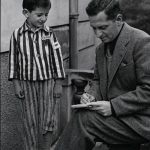The Quiet Scream: When Exhaustion Falls Silent
- KimLoan
- October 13, 2025

The headline was a raw, shocking punch: a 47-year-old mother, driven to an unimaginable limit, ended two lives in one tragic moment—her own and that of her son, Esteban, a child with autism. The public reacted with horror and confusion, struggling to reconcile motherhood with such a devastating act.
But before the tragedy, this mother left behind a letter to her husband, Fernando Cuello—a farewell filled not with anger, but with a lifetime of profound, unrelieved pain and exhaustion.

A Cry in the Silence
Her words, later published, cut deep—a quiet scream from a soul that had long been unseen, unheard, and emotionally unloved:
“Now you can live,” she wrote. “You won’t have to travel anymore. All I ever wanted was a hug—one for me, one for Esteban. A kiss in the morning before you go to work. We didn’t ask for much… We won’t ask again. But you’ll remember us forever.”
This is not merely a sensational story of violence. It is a mirror reflecting the catastrophic consequences of what happens when mental health, relentless caregiving, and emotional neglect are allowed to fester in silence, especially for mothers who give everything until there is absolutely nothing left to give.

The Invisible Weight
Every day, countless women silently drown beneath the enormous weight of caring, responsibility, and agonizing loneliness. For mothers raising children with special needs—children who require a degree of physical, emotional, and logistical support that consumes every waking hour—every day is both a testament to unconditional love and an exhausting, unending battle.
What hurts most is not the struggle of the diagnosis or the complexity of the daily routines, but the absence of anyone to catch them when they fall. Society, wrapped up in the romanticized idea of maternal self-sacrifice, rarely asks, “How are you really?” We assume they are fine, powered by an innate, endless motherly strength.

But often, behind those tired smiles and the meticulous scheduling, these mothers are holding on by the sheerest of threads—waiting for one act of kindness, one gentle touch, one sign that they, the caregiver, still matter. They are functioning on empty, unable to find the words to articulate the depth of their depletion.
Sometimes, exhaustion doesn’t scream for help—it falls chillingly silent. And in that silence lie the deepest, most dangerous wounds.
A Wake-Up Call for All of Us

This tragedy is not about judging one family’s private agony; it is a profound wake-up call for all of us about the state of our shared responsibility. The mother’s desperate final words—“We didn’t ask for much…”—illuminate a profound truth: human connection is not a luxury, but a necessity for survival.
We must stop treating mental health—and the crushing isolation of full-time caregiving—as an individual afterthought. It is a societal failure when a person reaches a point of such profound desperation.
It doesn’t take wealth, access to complex therapy, or grand gestures to prevent this kind of collapse. It requires something much simpler: presence.

A simple, genuine “How are you doing?” followed by the grace to truly listen to the answer, can be enough to pull someone back from the brink. It can save a life by breaking the isolation.
Because sometimes, all someone needs… is to know they are not alone. We have to commit to asking, to listening, and to sharing the load, before the silence takes another life.










